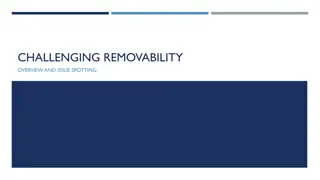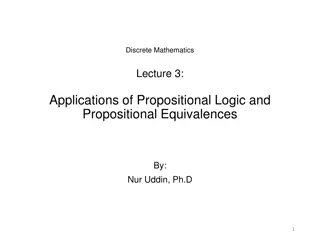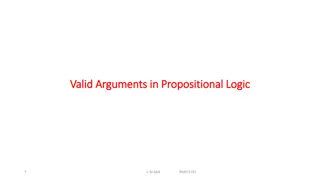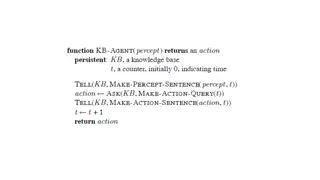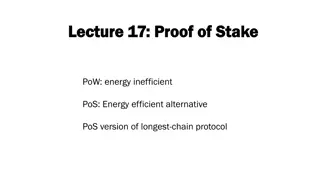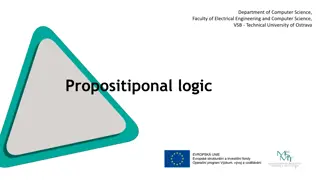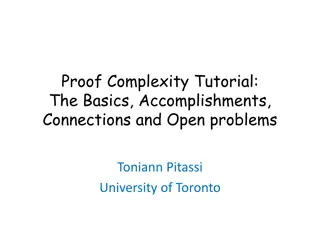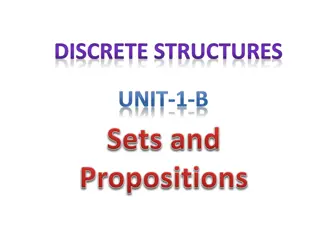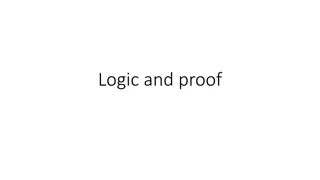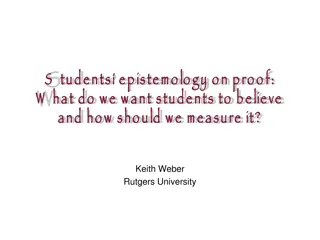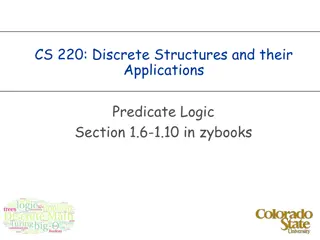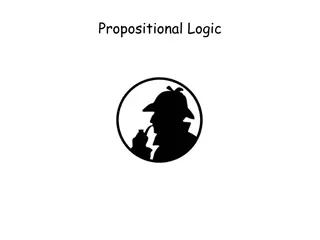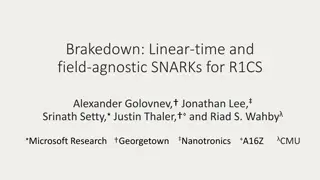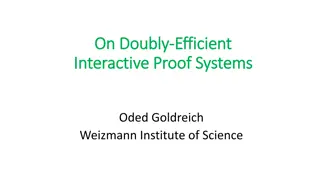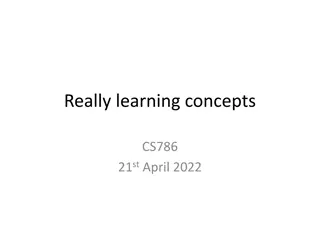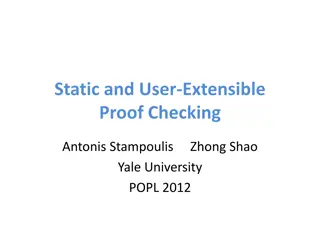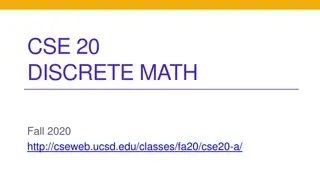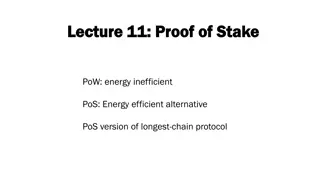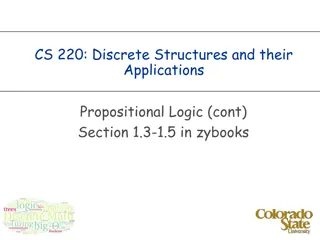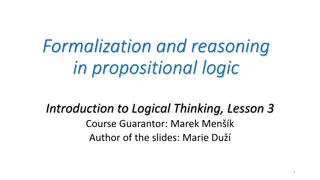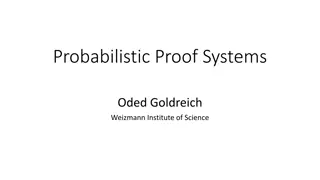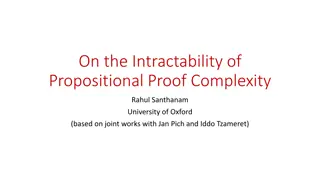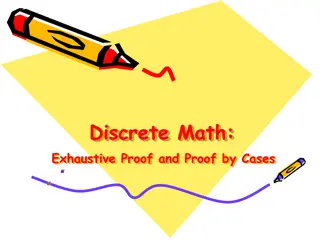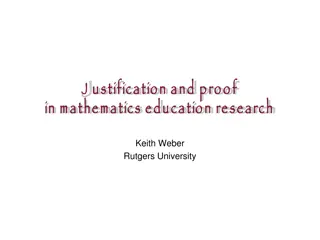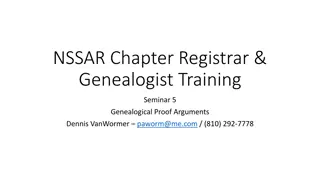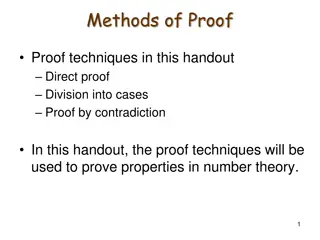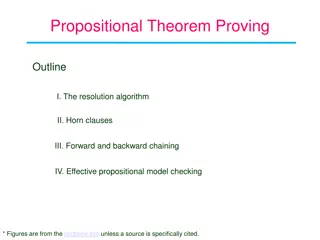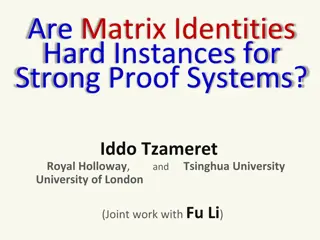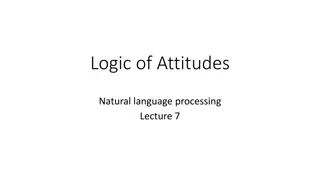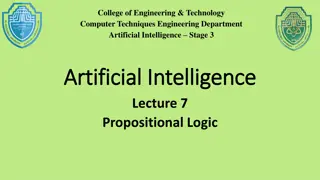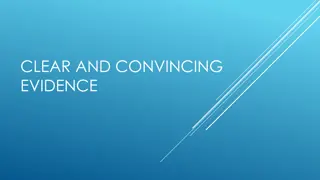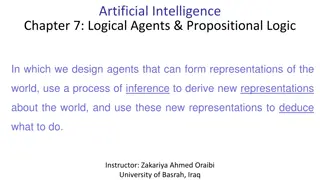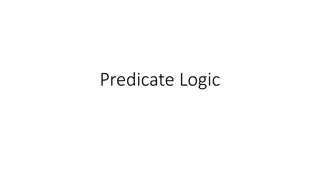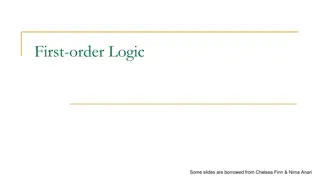Discrete Mathematics
Explore the foundations of logic and proofs in discrete mathematics, focusing on compound propositions, bit operations, and applications of propositional logic. Learn about how computers use bits for information representation and manipulation, and delve into translating English sentences into logic
5 views • 15 slides
Evolution of Mathematical Theories and Proof Systems
Development of mathematical theories such as model theory, proof theory, set theory, recursion theory, and computational complexity is discussed, starting from historical perspectives with Dedekind and Peano to Godel's theorems, recursion theory's golden age in the 1930s, and advancements in proof t
1 views • 29 slides
Understanding Burden of Proof in Removal Proceedings
This material provides an overview of challenging removability issues, burden of proof on removal charges, and key aspects related to Notice to Appear (NTA) and factual allegations in immigration cases. It discusses who holds the burden of proof in different scenarios, such as arriving aliens and th
1 views • 16 slides
Applications and Equivalences in Propositional Logic
This lecture explores applications of propositional logic, including translating sentences, system specifications, logic puzzles, and logic circuits. It also defines tautology, contradiction, and contingency as types of compound propositions, along with logical equivalences. Examples and illustratio
0 views • 16 slides
Understanding Valid Arguments in Propositional Logic
An argument in propositional logic consists of premises leading to a conclusion. Valid arguments are those where the truth of the premises implies the truth of the conclusion. To determine validity, you can construct a truth table to check if the conclusion always holds when all premises are true. T
0 views • 9 slides
Blockchain Without Waste: Proof-of-Stake
A study on Proof-of-Stake (PoS) as an alternative to Proof-of-Work (PoW) in blockchain technology. PoS aims to create a sustainable permissionless blockchain by selecting a stakeholder to authorize transactions without the heavy energy consumption of PoW. The paper provides a formal economic model o
0 views • 16 slides
Understanding Forward Chaining in Propositional Logic
Forward chaining in propositional logic is a recursive, stack-based version of back-chaining that can be modified to handle variables using unification and negation context. By applying a set of rules and facts, the process aims to prove a given query by iteratively inferring new information. Illust
0 views • 11 slides
Understanding Propositional Logic and Logical Operators
Learn about propositional logic, statements, logic operators, compound statements, exclusive-or, logical equivalence, and writing logical formulas for truth tables. Explore how to create compound statements for exclusive-or using different approaches and ensure logical equivalence. Enhance your know
0 views • 26 slides
Proof of Stake: Energy-Efficient Alternative to Proof of Work
Proof of Stake (PoS) is presented as an energy-efficient replacement for Proof of Work (PoW) in blockchain protocols. PoS allows meaningful participation based on stakeholders' coin ownership, proportional to their stake. The process of finding nonces in PoW is replaced by owning coins in PoS to par
0 views • 16 slides
Understanding Normal Forms in Propositional Logic
Explore the concept of normal forms in propositional logic, where each formula has a unique truth-value function. Learn about equivalence of formulas, determining normal forms, and canonic forms like Disjunctive Normal Form (DNF) and Conjunctive Normal Form (CNF). Discover how to find canonic forms
1 views • 22 slides
Understanding Propositional Logic at Kwame Nkrumah University
Dive into the world of symbolic logic and compound statements with a focus on Propositional Logic at Kwame Nkrumah University in Ghana. Explore the concepts of connectives, simple and compound statements, truth values, and more. Enhance your logical reasoning skills through a tutorial on symbolic lo
0 views • 57 slides
Exploring Proof Complexity: The Basics, Achievements, and Challenges
Delve into the intricacies of proof complexity, covering propositional, algebraic, and semi-algebraic proof systems, lower bound methods, and algorithmic implications. Discover fundamental connections to complexity theory and open problems in the field.
0 views • 76 slides
Mathematical Proof Methods and Divisibility Rules
In this lesson, we explore various methods of proof in mathematics, including direct proof, contrapositive, proof by contradiction, and proof by cases. We delve into basic definitions of even and odd numbers and learn about proving implications. Additionally, the concept of divisibility, prime numbe
0 views • 30 slides
Understanding Propositional Logic and Mathematical Logic in Computer Science
Study the development of formal logic in computer science, focusing on propositional logic and mathematical logic. Learn about propositions, logical operators, and ways of combining statements to derive conclusions. Explore examples and understand how to determine the validity of arguments using log
0 views • 38 slides
Insights into Logic and Proof: A Historical Journey
Delve into the historical timeline of logic and proof, from ancient Egyptian mathematical activities to modern advancements in computational proof assistants. Discover the evolution of symbolic logic and the development of proof systems like natural deduction. Explore the significance of logical exp
0 views • 36 slides
Understanding Students' Epistemology on Proof in Mathematics Education
Explore the role of proof in mathematics education, focusing on how mathematicians and students approach and understand proofs. Delve into the challenges undergraduates face in justifying claims deductively and the historical shifts in investigating proof in education.
1 views • 72 slides
Understanding Predicate Logic: From Propositional to Predicate Logic
Transitioning from propositional to predicate logic allows reasoning about statements with variables without assigning specific values to them. Predicates are logical statements dependent on variables, with truth values based on those variables. Explore domains, truth values, and practical applicati
0 views • 34 slides
Understanding Propositional Logic Concepts
Explore different facets of propositional logic, including conditional statements, logic operators, logical equivalence, contrapositives, and proofs. Delve into the intricacies of if-then statements, logical negations, and the nuances of if, only-if conditions. Enhance your understanding of proposit
0 views • 25 slides
Breakdown: Linear-time and Field-agnostic SNARKs for R1CS
Breakdown discusses linear-time and field-agnostic SNARKs for R1CS, focusing on achieving fast prover speeds and supporting circuits over arbitrary finite fields. SNARKs offer efficient proof systems with sub-linear proof sizes and verification costs. The work aims to eliminate the need for FFT-frie
0 views • 28 slides
Efficient Interactive Proof Systems Overview
This document discusses various aspects of efficient interactive proof systems, including doubly efficient IPs, simple doubly efficient IPs, and the Sum-Check Protocol. It explains concepts such as completeness, soundness, and strategies for verifiers and provers. The content covers examples like NP
0 views • 12 slides
Understanding Conceptualization in Machine Learning
Discussion on two types of representations (Propositional, Non-propositional) and the role of similarity in categorizing stimuli. Exploring supervised and unsupervised categorization methods, along with the capabilities of conceptualization beyond classification and clustering. Comparison of human a
0 views • 21 slides
Exploring Architecture and Challenges of Proof Assistants
Explore the architecture of proof assistants, discussing the use of tactics, formal proofs, and the difficulty in utilizing these tools. Discover the contribution of a new architecture for proof assistants, addressing extensibility and error checking, with a focus on soundness guarantees. Delve into
0 views • 41 slides
Discrete Mathematics Learning Goals and Examples in Propositional Logic
Explore the learning goals in discrete mathematics focusing on translating English sentences to propositional logic, evaluating compound propositions, forming converses and contrapositives, and determining consistency. Dive into examples of conditional statements, converse, inverse, contrapositive,
0 views • 14 slides
Understanding Proof of Stake in Blockchain Technology
This lecture delves into the concept of Proof of Stake (PoS) as an energy-efficient alternative to Proof of Work (PoW) in blockchain protocols. It explores how PoS allows meaningful participation based on the stake individuals hold, replacing the need for energy-intensive mining. The lecture discuss
0 views • 28 slides
Understanding Propositional Logic Fundamentals
Exploring the key concepts in propositional logic including conditional statements, converse, contrapositive, inverse, biconditionals, logical equivalence, operator precedence, and truth tables. Learn about the importance of truth values and logical equivalences in compound propositions.
0 views • 22 slides
Introduction to Propositional Logic: Formalization and Reasoning
Understanding formalization in propositional logic involves replacing atomic propositions with propositional variables and natural language connectives with logical connectives. The process abstracts from internal proposition structure, reducing meaning to True or False. The language allows formaliz
0 views • 18 slides
Understanding Probabilistic Proof Systems in Complexity Theory
Explore the world of probabilistic proof systems in complexity theory through the works of Oded Goldreich from the Weizmann Institute of Science. Dive into concepts like NP-proof systems, interactive proof systems, completeness, soundness, and efficient verification procedures with a focus on applic
0 views • 15 slides
Understanding Propositional Proof Complexity and Lower Bounds
Studies focus on the intractability of propositional proof complexity, exploring the power of proof systems to verify tautologies. Discussion on known lower bounds and challenges in proving hardness of certain tautologies.
0 views • 23 slides
Understanding Exhaustive Proofs and Proof by Cases in Discrete Math
Exhaustive proofs and proofs by cases are essential methods in discrete mathematics for proving theorems. Exhaustive proofs involve checking all possibilities, while proof by cases focuses on considering different scenarios separately. The methods are illustrated through examples like proving (n+1)^
0 views • 8 slides
Perspectives on Justification and Proof in Mathematics Education Research
This presentation explores diverse perspectives on proof in mathematics education, highlighting the role of proof in K-12 classrooms and discussing students' challenges with proof. It delves into research perspectives on what constitutes a proof, the goals of mathematics educators, and the link betw
1 views • 74 slides
Genealogical Proof Arguments and SAR Standard of Proof
This detailed content covers the definitions and components of genealogical proof arguments, proof summaries, and the SAR standard of proof. It explains the importance of evidence quality, source citations, and analysis in establishing acceptable genealogical conclusions for SAR membership applicati
0 views • 22 slides
Understanding Proof Techniques in Number Theory
Explore methods of proof, such as direct proof and proof by contradiction, to establish properties in number theory. Learn about even and odd integers, the method of direct proof, writing proofs effectively, common mistakes to avoid, and types of mathematical statements like theorems, propositions,
0 views • 15 slides
Propositional Theorem Proving Methods Overview
The overview covers essential techniques in propositional theorem proving including the resolution algorithm, Horn clauses, forward and backward chaining, and effective propositional model checking. It discusses methods such as resolution closure, completeness of resolution, and the significance of
0 views • 19 slides
Exploring Matrix Identities in Strong Proof Systems
This study delves into the complexity of matrix identities as potential challenges for robust proof systems. Through new algebraic techniques, the research aims to propose and analyze non-commutative polynomial identities over matrices, shedding light on lower bounds and conjectures for strong arith
0 views • 57 slides
Understanding Propositional and Notional Attitudes in Logic and Natural Language Processing
Explore the intricate concepts of propositional and notional attitudes in the context of logic and natural language processing. Dive into the distinctions between belief, knowledge, seeking, finding, solving, wishing, and wanting within the realms of individual intensions and hyper-intensions. Under
0 views • 16 slides
Understanding Propositional Logic in Artificial Intelligence
Covering the syntax, semantics, and logical inference in propositional logic for Artificial Intelligence. Learn about atomic sentences, logical connectives, operator precedence, and how to determine the truth value of sentences in a particular model. Dive into the rules and computations involved in
0 views • 28 slides
Understanding Burden of Proof and Standards of Evidence in Legal Proceedings
In legal proceedings, the burden of proof determines which party must prove their case to the trier of fact. The standard of proof refers to the level of certainty required to establish proof, with higher stakes demanding a higher standard. Decision-makers must apply clear and convincing evidence st
0 views • 13 slides
Understanding Logical Agents and Propositional Logic in AI
Designing logical agents involves forming representations of the world, using inference for deriving new insights, and deducing actions based on these representations. Knowledge Base (KB) is a crucial component, comprising known facts and current percepts to infer hidden states. Propositional logic,
0 views • 23 slides
Understanding Predicate Logic and Quantifiers
Predicate logic extends propositional logic by allowing statements to be assigned specific values. The limitations of propositional logic are overcome through predicate logic, where statements like "?. is greater than 3" have subject and predicate parts denoted as ?(?). Furthermore, predicates can b
1 views • 20 slides
Understanding First-Order Logic Fundamentals
Explore the limitations of propositional logic and delve into the syntax, semantics, and inference rules of first-order logic. Learn about predicates, quantification, and how to express relationships among objects using predicates. Enhance your understanding of how first-order logic provides a more
0 views • 42 slides


